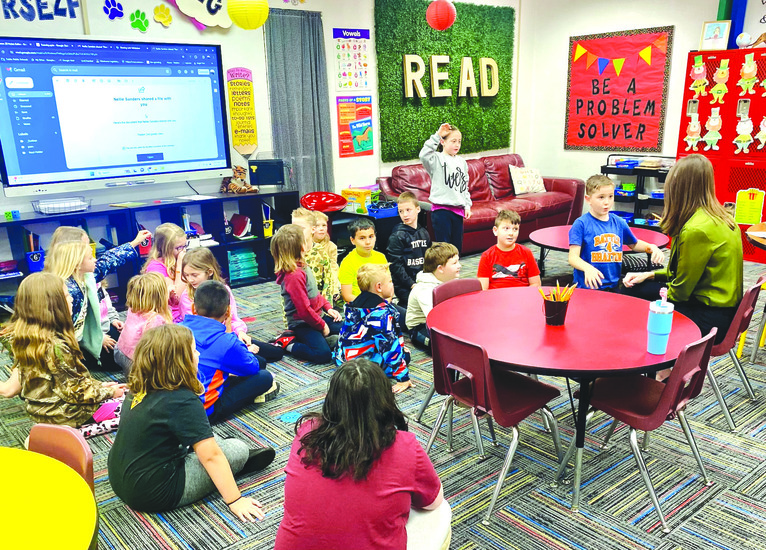-
 May 23, 2024As another school year winds down, students are eager to hang up their backpacks for the summer and trade learning activities for outdoor adventures. The classroom will be the last thing in many people’s thoughts for a while.
May 23, 2024As another school year winds down, students are eager to hang up their backpacks for the summer and trade learning activities for outdoor adventures. The classroom will be the last thing in many people’s thoughts for a while.
Yet for Nellie Sanders, the classroom is at the forefront of her mind every day.
Sanders, who in January was appointed to serve as Oklahoma’s Secretary of Education by Gov. Kevin Stitt, stepped into her role with zeal. She is passionately committed to providing learning opportunities more closely aligned with the individual needs of each one of the state’s approximately 700,000 students – including two of her own.
A parishioner of Saints Peter and Paul Catholic Church in Kingfisher, Sanders’ vision for education in Oklahoma is bolstered by her faith, personal experience and perspective. She, and both of her children, have dyslexia. Still, Sanders said the condition has not hindered her role as Secretary of Education, but enhanced it.
Sanders said her greatest asset in this position is dyslexic thinking, an approach to problem solving, assessing information and learning that involves pattern recognition, spatial reasoning, lateral thinking and interpersonal communication.
Sanders’ struggle as a young student drives her desire to “provide educational opportunities for students that are as unique as their own thumbprint.” Since being appointed to the governor’s cabinet, Sanders’ innovative spirit has been at the core of her mission to provide educational opportunities tailored to meet every student’s style of learning.
“I have the privilege of serving under the governor and he has tasked me with uniting educators to solve a lot of the difficulties that we have, like individual learning opportunities for all, creating career pathways for learning that we are going to need for this future of innovation,” said Sanders. “I am not afraid. I am actually inspired and excited to have real and honest conversations.”
A particular area of focus for Sanders is the use of standardized testing as a measure of a student's learning potential. In evaluating the role of standardized testing as it relates to preparing students to enter the workforce, Sanders asks the questions: Does this show us the real potential of our state, and what do we need to unlock in our students for the future we’re about to give them?
Sanders said that with the expansion of technology and innovation, the workforce gap in Oklahoma continues to grow. As a result, her efforts to close that gap are concentrated on providing educational opportunities that accentuate the talents and passions of every child which are unable to be measured through standardized testing. Her forethought in preparing Oklahoma students for the workforce exemplifies her desire to leave behind a legacy that will provide greater opportunities to the next generations of students.
Having had opportunities to visit schools across the state since taking office, Sanders’ admiration for Oklahoma’s teachers and educational leaders, coupled with her own experience, is apparent in her desire to provide support.
“I know what an invested education looks like in transforming opportunities. We’re not hitting them all, we’re not hitting the majority and teachers really need help,” she said.
“I really want to be the one to lead our state in individualized learning experiences, but we have to support our teachers in a way that they can unlock the ingenuity and brilliance, in every child, that is going to prepare them for this future.”
Stephanie Coles, a mother of two elementary-aged students, shares Sanders’ vision for equal educational opportunities for every student. As the parent of a special-needs child, Coles said she has been pleased with the opportunities her son has been given, yet she worries that schools in rural areas may not have access to equal resources.
“School staff, teachers and administrators need more to be able to support students and their families from the top up and the bottom down,” Coles said. “We need boots on the ground.”
Sanders’ visits to Oklahoma schools play a constructive part in devising effective strategies.
“We have incredible educators that can tell us where we really need to look to solve issues, where we need to evaluate,” Sanders said. “Behavior is often a symptom of something much deeper, and I see a lot of behavioral symptoms that are cries for things that are hard to admit. We can’t just put a band-aid over them.”
Rachel Gonzalez Stark, head principal at Moore High School, echoed Sanders’ sentiments.
“We've been seeing a lot of anxiety, depression and chronic absenteeism,” she said. “I see it coming through the schools starting at the elementary level, and it’s still an issue for them entering college,” Stark said. “We have to help these students and young adults who are preparing to enter the workforce.”
The importance of Sanders' role is not lost on her.
“We are on the cusp of one of the most exciting times in education,” she said. “We can create opportunities to level the playing field for every student, but that comes with great responsibility. We must be incredible stewards as we deploy these standards… that will become our Oklahoma standards.”
Sally Linhart is a freelance writer for the Sooner Catholic.

Photos provided.
